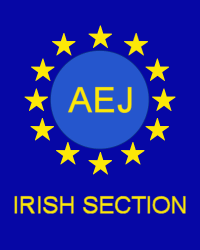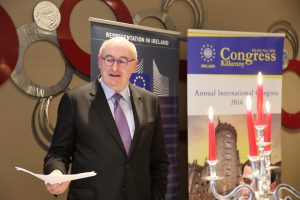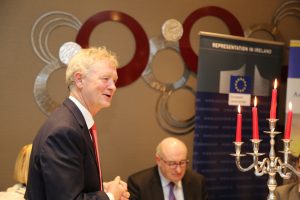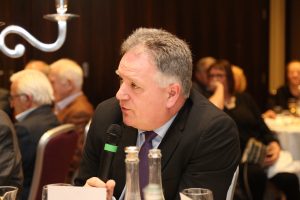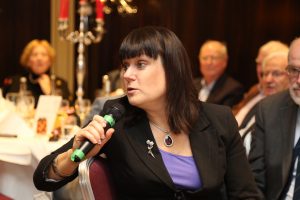Speech by EU Agriculture and Rural Development Commissioner, Phil Hogan at Christmas lunch, Hilton Hotel, Dublin.
I’d like to share a few thoughts on the current political landscape in Europe. Let me first say a few words on Brexit, which is the defining political challenge for the coming years.
Six months on from the vote in June and it’s painfully obvious that there is still no clear vision on how to move forward, no plan that comes even close to offering a better or more appealing future. Whitehall merely continues to spew out mixed messages.
David Davis has said the UK would consider the “Norway model,” which means making contributions to the EU budget in exchange for access to the single market.
This is in stark contrast to those favouring a “Hard Brexit,” such as Boris Johnson who always seems to believe passionately in whatever he’s saying at any given time. Meanwhile, Theresa May hides her views on Brexit behind a barricade of clichés.
I suppose we can be somewhat reassured by the sensible noises coming from Chancellor Philip Hammond, who has called for moderation on immigration controls and wants to maintain access to the single market. However, his is often a lonely voice.
All this means that there is likely to be a reckoning among the different forces in the Tory party once the roadmap is presented.
Regrettably, the Northern Irish peace process and the existing border arrangements on the island of Ireland seem to get scant attention in London.
Trade is also very tricky: if the UK leaves the EU Customs Union (as would be the case with a hard Brexit), the €60 Billion euro’s worth of economic activity and 400,000 jobs supported by Anglo-Irish trade could be threatened. Ireland’s agri-food sector would be in particular danger, given that 40% of our exports go to the UK.
Northern Ireland must NOT be a bargaining chip.
Michel Barnier, the Head of the Commission’s Brexit Taskforce is aware of these issues – I have met him on a number of occasions and will do so again to impress their importance on him.
But there also needs to be a greater urgency in Dublin to reflect that once the British trigger Article 50, the centre of power and influence on Brexit will move irrevocably away from London to Brussels. It’s in Brussels that the deal will be done, and this is where Ireland’s main strategic focus must be. I’m not convinced that Ireland is as yet allocating the necessary resources to Brussels to deal with this mammoth challenge.
The grave danger is that everyone focuses on the UK, what it will ask for, how the Commission will reply. The truth is that whatever the EU-UK outcome will be, there’s a job to be done between Ireland and the EU to make sure that the collateral damage to Ireland is recognised and minimised. Ireland needs to get its facts together, to have its dossiers and arguments ready. Michel Barnier has already said that once we get past March, things will kick on at a rapid rate. Ireland needs to be riding up with the leaders.
We need to ensure that we have the relationships established and maintained to facilitate a clear and direct understanding of Ireland’s unique exposure to Brexit at the Council, Commission, and also the European Parliament, which has a vote on any deal.
EU Priorities/EC Work Programme 2017
It’s all too often forgotten that there is an enduring added value of doing things at European level.
We’re building a European Energy Union which will ensure our citizens have secure, affordable and climate-friendly energy.
We are making good progress in negotiating a Free Trade Agreement with Japan which will, I hope, have significant benefits for agriculture, including in particular the Irish beef sector.
In January the Commission will outline plans to propose legislation for a fully functioning single market in services. In essence, this will mean that a business can go anywhere in Europe and provide its services without barriers.
Services represent the largest component in our economy (70%), and most new jobs (up to 90%) are generated in the sector.
But we are underperforming: the productivity growth of the EU services sector consistently falls behind that in the U.S. whilst the rest of the world is catching up with us. So this initiative is on the money, and could be a huge step forward for the European economy.
Other key priorities for the Commission in 2017 include: addressing the migrant crisis, pursuing a Security Union to fight terrorism, and deepening the Investment Plan for Europe.
The so-called “Juncker Plan” is already bearing fruit, including in Ireland: just this week, the European Investment Fund (EIF) and Strategic Banking Corporation of Ireland (SBCI) signed an agreement to provide €100 million in loans to Irish SMEs. Again, very few Irish media covered this announcement, which is significant, and positive.
The reality is that sometimes indisputable good news stories are not on our citizens’ radar, either through our own failure to communicate them but often through the failure of national politicians and media to talk about these issues. And I think that needs to change, if we are to fight back against the dark forces gathering on the political extremes. In my view, journalism needs to strike a balance between reporting the news and relentless personal analysis.
There is an alternative to right-wing populism. For that alternative to win, not alone does the level of anger and frustration with the conventional political system need to be understood, but the causes of that anger and frustration need to be understood. Only then, can political parties offer something to compete with populist feelings.
In recent months and perhaps for some years, populism has manifested itself in a strong anti-EU attitude and I think most people would agree that the Institutions have been slow in reacting to that situation.
I believe in the EU and I’m certain that the EU is good for the continent of Europe and for its Member States. But is the EU perfect – I don’t know anybody who would argue that.
The EU has been in existence for nearly 60 years. In that period, Europe has had its longest unbroken period of peace. The continent has recovered from a situation of grave food security in the immediate aftermath of the Second World War, to delivering a successful CAP with thousands of jobs directly and indirectly in rural areas.
